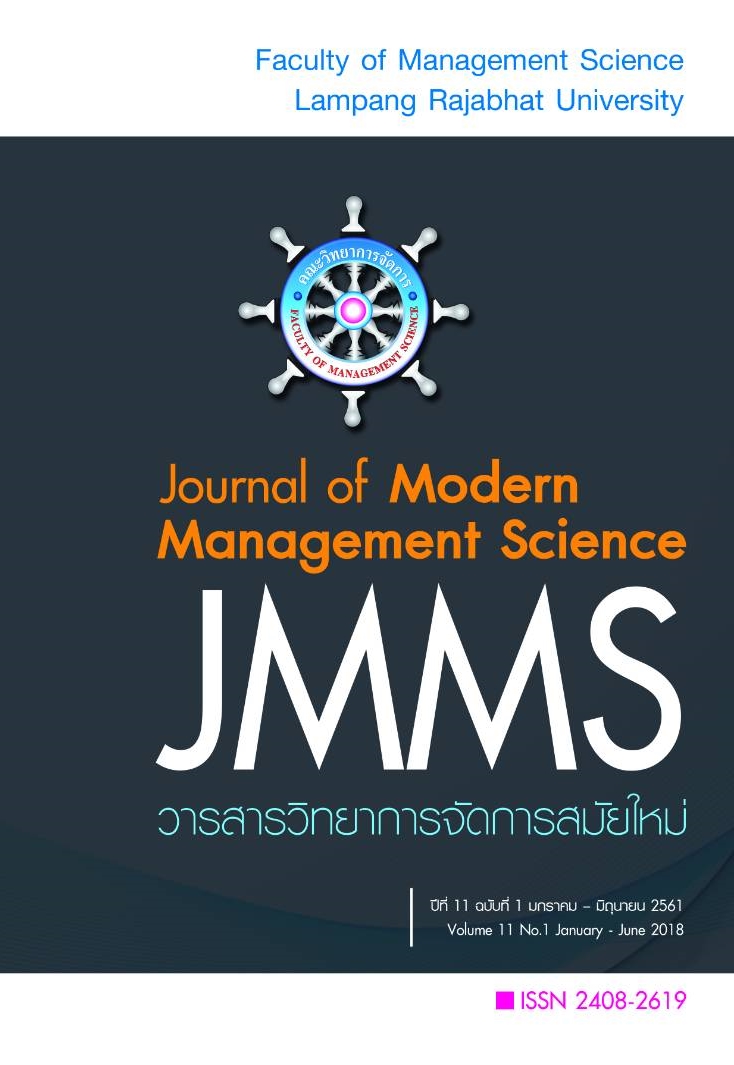Antecedents Impacting on Achievement of Using Problem-Based Pedagogy for Student’s Learning on Auditing Course
Main Article Content
Abstract
In order to develop pedagogical technique for the effective achievement of student’s learning on auditing course. The primary objective was to investigate the factors that accounting students in Suratthani Rajabhat University have always failed to learn on auditing course. Questionnaires (102 respondents) and semi-structured interviews (15 respondents) were used for collecting data from undergraduate accounting students. Statistical techniques, which are descriptive, Pearson correlation coefficient, and multiple regression analysis, were employed to analyze questionnaires. The content analysis was used for analyzing interview data by using a phenomenological research approach. The result of research revealed that insufficient skills, knowledge and experiences; insufficient practical training on auditing cases; insufficient IT learning equipments; inappropriate classroom environments; and inappropriate pedagogical methods have been importantly caused for the ineffective student’s learning on auditing course, especially a lack of student’s competencies in terms of the basic knowledge of the financial reporting standard and the suitable auditing knowledge, skills and experiences in parts of audit techniques, test of control, audit working papers, and audit reports. At the same time, accounting student’s competencies, practical training on auditing cases, pedagogical methods, IT learning equipments, and classroom environments have positively had direct relationships and patently influenced the achievement of student’s learning on auditing course at the significance level of 0.01. Many problems on student’s learning on auditing course must have been solved for more effective schooling in the future when those have always been supported by related parties.
Article Details
The article must be considered and accepted for publication by the editorial board of the Faculty of Management Science, Lampang Rajabhat University. The articles have been reviewed by a peer (peer review) and the author must update according to the suggestion if available before publication. Articles that are not considered the editorial team will inform the results of the consideration but will not send the original to the author.
JMMS is the Faculty of Management Science journal, Lampang Rajabhat University. Jmms published both print and online editions. We allow the use of articles for academic use under the scope of copyright law.
References
Badua, F. A., Sharifi, M., & Watkins, A. L. (2012). The Topics, They are A-Changing: The State of the Accounting Information Systems Curriculum and the Case for a Second Course. The Accounting Educators’ Journal, 21(1), 89-106.
Black, W. H. (2012). The Activities of the Pathways Commission and the Historical Context for Changes in Accounting Education. Issues in Accounting Education, 27(3), 601-625.
Carter, F. L. & Hogan, P. T. (2013). Integrative Active Learning and Assessment in the Accounting Classroom. Journal of Instructional Pedagogies, 11, 1-16.
Cosserat, G. W. & Rodda, N. (2009). Modern Auditing. 3rd Edition, Wiley: Hoboken, NJ., 415 Pages.
DeFond, M., & Zhang, J. (2014). A review of archival auditing research. Journal of Accounting and Economics, 58, 275–326.
Edstrom, K. (2008). Doing Course Evaluation as If Learning Matters Most. Higher Education Research & Development: Routledge Tayor & Francis Group, 27(2), 95-106.
Grenier, J., Pomeroy, B., & Stern, M. (2015). The effects of accounting standard precision, auditor task expertise, and judgment frameworks on audit firm litigation exposure. Contemporary Accounting Research, 32(1), 336–357.
Holm, C. & Steenholdt, N. (2000). Measuring Learning Outcomes-Evaluation of Cognitive Skills Among Graduate Students in Auditing. Germany: The 23rd Annual Congress of the European Accounting Association, Working Paper, 1-20.
Imbiri, W. (2015). Accounting Students Attitude towards Computer, the Acceptance of the Accounting Information System’s Course and Teaching Method. ScienceDirect: Procedia-Social and Behavioral Sciences, 172, 18-25.
Kirschner, P. A. & Van Merrienboer, J. J. G. (2013). Do Learners Really Know Best? - Urban Legends in Education. Educational Psychologist, 48(3), 169-183.
Kuruppu, N. (2012). A Structured Pedagogy for Integrating Generalized Audit into the Auditing Curriculum. Business Education & Accreditation, 4(1), 113-121.
Lambert, T., & Agoglia, C. (2011). Closing the loop: Review process factors affecting audit staff follow-through. Journal of Accounting Research, 49(5), 1275-1306.
LaShaw, M. N., Sago, B., & Lambert, T. (2013). University Student Perceptions and Learning Outcomes of an Experiential Audit Project. International Journal of Business, Humanities and Technology, 3(3), 1-11.
Lysaght, Z. (2015). Assessment for Learning and for Self-Regulation. The International Journal of Emotional Education, 7(1), 20-34.
Mahama, H., Elbashir, M. Z., Sutton, S. G., & Arnold, V. (2016). A Further Interpretation of the Relational Agency of Information Systems: A Research Note. International Journal of Accounting Information Systems, 20, 16-25.
Plumlee, D., Rixom, B., & Rosman, A. (2015). Training auditors to perform analytical procedures using metacognitive skills. The Accounting Review, 90(1), 351-369.
Schwartz, S. T., Spires E. E., & Young, R. A. (2002). Experiential Learning in Auditing: Four Experiments for the Classroom. Working Paper, 1-37.
Su, X., Dunston, P. S., Proctor, R. W., & Wang, X. (2013). Influence of Training Schedule on Development of Perceptual-Motor Control Skills for Construction Equipment Operator in A Virtual Training System. Automation in Construction, 35, 430-447.
Uachanachit, D. (2004). Measuring Effectiveness of Teaching by Using Three Teaching Methods in Intermediate Accounting 1, Faculty of Accountancy, Dhurakijpundit. Dhurakijpundit University-The Research Report in Class: Independent Study, 36-42.
Van Peursem, K. A., Monk, E. A., Wilson, R. M. S., & Adler, R. W. (2015). Audit Education. 1st Edition, Routledge Taylor & Francis Group, 156 pages.
Wang, D., Feng, T., Freeman, S., Fan, D., & Zhu, C. J. (2013). Unpacking the Skill – Cross-Cultural Competence Mechanisms: Empirical Evidence from Chinese Eexpatriate Managers. International Business Review, 23(3), 530-541.
Well, P. (2015). A Strategy for Improving Student Engagement in Auditing: Edivence from Reflective Journals. AUT Research Seminars 2015, New Zealand, 12-25.
Westermann, K., Earley, C., & Bedard, J. C. (2015). Learning the “craft” of auditing: A dynamic view of auditors’ on-the-job learning. Contemporary Accounting Research, 32(3), 864-896.
Wong, L. & Fong, M. (2014). Student Attitudes to Traditional and Online Methods of Delivery. Journal of Information Technology Education: Research, 13, 1-13.


